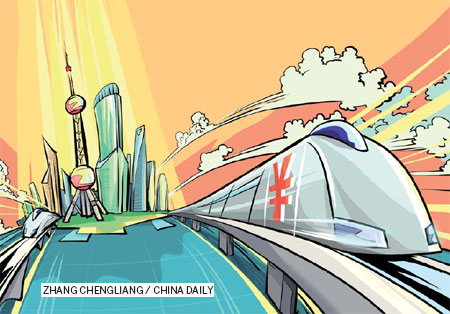Harbinger of reform in Shanghai
Updated: 2013-10-04 08:58
By Zhu Ning (China Daily)
|
|||||||||||
Free trade zone will be the precursor for further opening up China's economy and financial sector
China's first free trade zone has been set up in Shanghai on Sept 29. The long-awaited policy incentive puts Shanghai once again at the center of reform and opening up of the Chinese economy. The policy also comes at an opportune time with Shanghai's economic growth trailing that of many other provinces in the past few years. This is the catalyst Shanghai has sought to boost its economy in the coming decade.
Many believe the new FTZ will serve as a testing ground for China's economic reform and development of the financial system. The FTZ launch a series of polices aimed at promoting trade, attracting foreign investment, and enhancing operational efficiency. Tax subsidies and exemptions, import and export regulation, and requirements for investment and operation have all been areas to benefit from fundamental deregulation and relaxation.
Interestingly, even though it is called a free trade zone, some of the finance-related aspects have garnered more attention.
For example, the convertibility of yuan in the FTZ has attracted considerable attention from both domestic and overseas players. At the moment, the yuan lacks full convertibility. Even in other testing zone areas such as Shenzhen Qianhai, where Hong Kong banks can provide cross-border yuan loans to Chinese mainland companies operating in the zone, the yuan is not fully convertible. Full convertibility of the yuan is something that many have yearned for.
Achieving full convertibility will make the yuan a truly international currency and accomplish a big task in financial sector reforms. At the same time, the full convertibility of yuan will also bring the Chinese domestic financial system closer to the global financial system, thereby inducing and facilitating further reforms like market-determined domestic interest rates and the renminbi exchange rate.

However, there are risks related to such reforms, which is partly why Shanghai has been chosen as a testing ground for the rest of the country. The 1997-98 Southeast Asia financial crisis suggest that currency convertibility and liberalization of capital accounts may invite highly liquid and short-term speculative capital to flow into and out of a country in a way that is detrimental to the economy and business operations of the home country. Any country attempting to liberalize its currency and capital account would therefore have to balance the benefits and risks related to how fast and aggressively it plans to move ahead.
Another complication in such liberalization is that it may have profound impact on the domestic economy. As the yuan's exchange rate becomes fully market determined Chinese companies, especially the export companies highly dependent on overseas orders, would have to learn to manage increasing risks related to exchange rate fluctuations. At the same time, the market-determined interest rate would force many companies, which have been accustomed to regulated and subsidized interest rates, to re-evaluate their financial viability and competitiveness. Finally, Chinese banks, which command a lion's share of the Chinese financial sector as measured by total assets, have already witnessed their bottom line being eroded by the development of semi-market-determined interest rates. Further reform along that direction may exert further pressure on banks and "shadow banks".
On one hand, such risks would suggest it is best to slow down the pace of reform. On the other, China's economy has become so large, complicated, and international, that it cannot wait any longer for such reforms to take place. This is why it is so important that Shanghai carries out the pilot free trade zone. Endowed with policies that would minimize the influence of authorities and regulators', the Shanghai free trade zone has the potential to showcase the benefits, and risks, of further reform and openness. Such ambitions, if successful, will provide much needed confidence and resolution to push forward the next step in economic and social reforms.
Last but certainly not the least, Shanghai has been striving to adjust its industry composition during the past decade. It has recently become apparent during the recent economic slowdown that, what Shanghai has been experiencing and working with in the past decade, may over time become the same challenge facing many other Chinese provinces. Consequently, whether Shanghai can successfully transform its economy from manufacturing to services through the free trade zone, may hold invaluable lessons to the rest of the country in how to optimize policy incentives and modernize the regional economy.
After the announcement of the decision to establish the free trade zone in Shanghai, there has been widespread speculation about the timetable and roadmap for the free trade zone and the next step of reform in China. At the same time, some other municipality governments have sensed the opportunity and submitted applications to establish free trade zones under their purview.
This brings up another important objective to be achieved in establishing the Shanghai free trade zone. Considerable deregulation has been announced in the free trade zone. A wide variety of business activities, ranging from setting up foreign companies, non state-owned banks, and joint venture banks, to tariff and tax filing, will all require far less involvement from the government.
The balance between the state-owned economy and private business has become a recent focal point of discussion. On the one hand, the experience of other developed economies has historically shown the importance of small and medium-sized companies' contribution to employment, community development, and diverse social values. On the other hand, China's reality in the past few years is that the state plays an important role in the economy. This can be reflected by the increasing size and power of state-owned enterprises, the increasing requirement for entry into some key areas, and the slowing down in reform in certain economic and social areas.
By setting up the free trade zone with less regulation and influence from the state, China is also trying to experiment on how to strike a better balance between the state and market.
Shanghai is probably a natural choice for such experiments. With its historical heritage of international exposure and openness, Shanghai is famous for its pragmatic viewpoint, dedicated level of services, and inclusive culture. Right before the Japanese invasion into China in the 1930s, Shanghai was an even more prominent world trade and finance center than Hong Kong. Many now famous global corporations and financial institutions, the Hong Kong and Shanghai Bank Corporation included, can trace their roots back to Shanghai, which makes it a far more attractive destination for such companies to contemplating a return to China.
In addition, Shanghai is also known in China for its free market friendly attitude. Such a philosophy held by the city and government coincides well with the spirit of China's next-step reforms. After all, despite the occasional malfunction, deregulation and allowing market forces to allocate resources and risks has been a central theme of successful economic development in many developed economies.
The author is a faculty fellow at the International Center for Finance, Yale University; and deputy director of the Shanghai Advanced Institute of Finance, Shanghai Jiaotong University. The views do not necessarily reflect those of China Daily.

(China Daily European Weekly 10/04/2013 page10)
Today's Top News
China, Russia co-work for security in Asia-Pacific: Xi
Animal welfare to be added in training
Talks 'can help Chinese banks' in UK
Robust home sales during holiday
APEC 'should take lead' in FTA talks
Beijing targets polluting cars
China warns US, Japan, Australia over sea issues
US on path to default if Obama won't negotiate
Hot Topics
Lunar probe , China growth forecasts, Emission rules get tougher, China seen through 'colored lens', International board,
Editor's Picks

|

|

|

|

|

|





